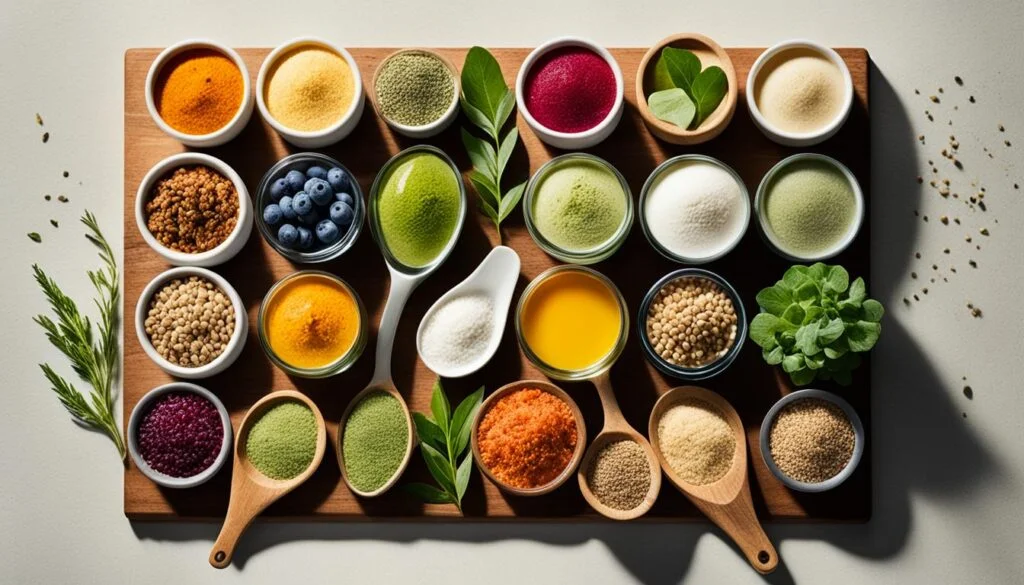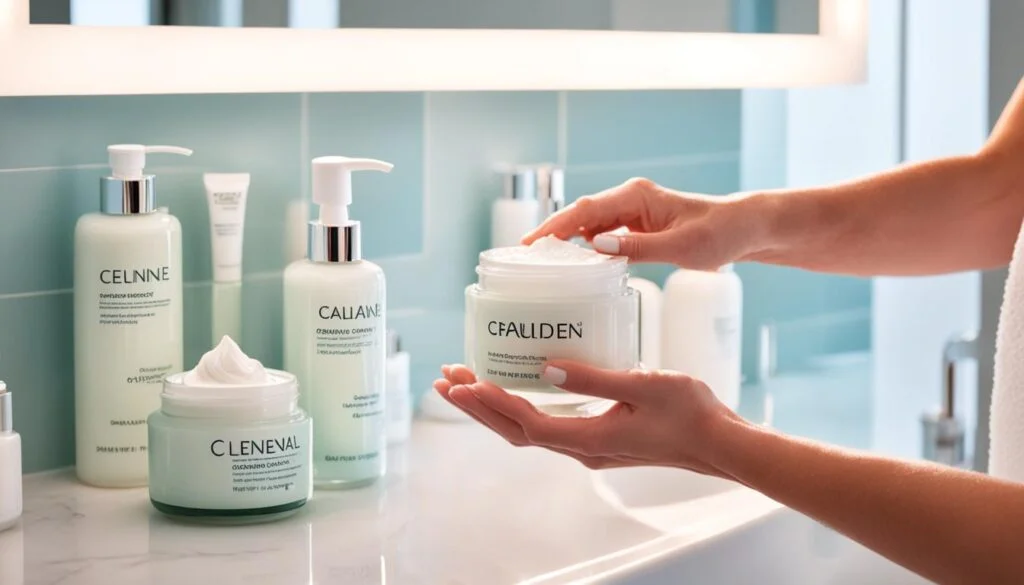When it comes to preserving youthful, radiant skin, women often find themselves bombarded with countless skincare and anti-aging options. But with so much information out there, what truly works? Are there essential tips and practices that can help women maintain healthy, glowing skin as they age? And is it ever too late to start taking care of your skin?
Thank you for reading this post, don't forget to subscribe!In this comprehensive guide, I will debunk common myths and reveal science-backed strategies to help you achieve and maintain healthy skin as a woman. From understanding the aging process and its impact on skin to choosing the right skincare products and exploring natural remedies, we will cover everything you need to know about achieving a youthful complexion. So, get ready to dive into the fascinating world of skincare and anti-aging!
Key Takeaways
- Learn about the aging process and its effects on the skin.
- Understand the role of collagen and elastin in skin aging.
- Identify the signs of aging and how to address them.
- Discover skincare and anti-aging quick tips tailored for women.
- Explore the importance of sun protection in preventing premature aging.
Understanding the Aging Process and Its Impact on Skin
As we age, our skin goes through several changes that can impact its appearance and health. It is important to understand the aging process and how it affects our skin in order to make informed choices about our skincare routines and products. In this section, we will delve into the role of collagen and elastin in skin aging, as well as identify common signs of aging, from wrinkles to thin skin.
The Role of Collagen and Elastin in Skin Aging
Collagen and elastin are two key proteins that play a vital role in maintaining the youthful appearance and elasticity of our skin. Collagen provides structural support, while elastin allows the skin to snap back into place after being stretched or compressed.
However, as we get older, the production of collagen and elastin in our bodies decreases, leading to visible signs of aging, such as sagging skin and the formation of wrinkles. Additionally, environmental factors like sun exposure and lifestyle choices like smoking can further accelerate the breakdown of collagen and elastin.
Identifying the Signs of Aging: From Wrinkles to Thin Skin
One of the most common signs of aging is the development of wrinkles. These can appear as fine lines around the eyes, forehead furrows, or deeper folds around the mouth. Wrinkles occur due to a combination of factors, including the loss of collagen and elastin, muscle movement, and repeated facial expressions.
Another noticeable change in aging skin is the thinning of the skin’s outermost layer, known as the epidermis. This thinning can cause the skin to become more fragile and prone to bruising, tearing, and dryness. It may also result in the appearance of prominent veins and age spots.
In addition to wrinkles and thin skin, other signs of aging include the loss of facial volume, decreased skin elasticity, and uneven skin tone. These changes can contribute to an aged and tired appearance.
Understanding the aging process and being able to identify the signs of aging is essential for developing an effective skincare routine and choosing the right products to address specific concerns. In the following sections, we will explore various skincare and anti-aging tips that can help women maintain youthful and healthy-looking skin.
| Signs of Aging | Description |
|---|---|
| Wrinkles | Visible lines and folds in the skin |
| Thin Skin | Reduced thickness of the skin’s outer layer |
| Loss of Facial Volume | Decreased fullness and plumpness in the face |
| Decreased Skin Elasticity | Reduction in the skin’s ability to bounce back |
| Uneven Skin Tone | Irregular pigmentation and discoloration |
Skincare, Anti-Aging Quick Tips for Women, Ingredients for Healthy Skin
When it comes to achieving and maintaining healthy, youthful skin, having a proper skincare routine is essential. As women, we are often looking for quick and effective tips to combat the signs of aging and promote optimal skin health. In this section, I will share some valuable insights and recommendations to help you on your skincare journey.
The Importance of a Skincare Routine
Establishing a consistent skincare routine is the foundation for achieving healthy skin. A well-rounded routine should include cleansing, toning, moisturizing, and protecting the skin from harmful UV rays. Remember to cleanse your face twice a day to remove dirt, oil, and impurities that can clog pores and lead to skin concerns.
Utilizing Natural Ingredients
When it comes to skincare, natural ingredients can provide powerful benefits. Look for products that contain ingredients like hyaluronic acid, vitamin C, retinol, and peptides. Hyaluronic acid helps to hydrate and plump the skin, while vitamin C brightens and protects against environmental damage. Retinol aids in reducing the appearance of wrinkles and fine lines, while peptides promote collagen production for smoother and firmer skin.

There are several key ingredients to look out for when choosing skincare products. For hydration, ingredients like glycerin, ceramides, and niacinamide are excellent choices. For anti-aging benefits, consider incorporating products with antioxidants like green tea extract and resveratrol. Additionally, for brightening and evening out skin tone, look for ingredients such as kojic acid, licorice extract, and alpha arbutin.
Incorporating these skincare tips and utilizing products with targeted ingredients can help you achieve and maintain healthy, radiant skin. Remember, consistency is key, and patience is necessary as it may take time to see the full effects of your skincare routine. Stay committed to your skincare goals, and you’ll reap the rewards of a youthful complexion.
The Importance of SPF: Your Daily Armor Against Premature Aging
Sun protection is not just a summertime necessity; it should be an integral part of your daily skincare routine. The harmful UV rays of the sun can cause significant damage to your skin, leading to premature aging, wrinkles, and other signs of sun damage. That’s where SPF comes in.
Selecting the Right Sunscreen for Your Skin Type
When it comes to choosing sunscreen, one size does not fit all. Different skin types have different needs, so it’s essential to select a sunscreen that is tailored to your skin. If you have oily skin, opt for lightweight, oil-free formulas that won’t clog your pores. Dry skin, on the other hand, will benefit from moisturizing sunscreens to keep it nourished and hydrated. Combination skin may require a balance of oil control and hydration. Look for sunscreens labeled as “broad-spectrum” to ensure protection against both UVA and UVB rays.
How to Integrate Sun Protection into Your Skincare Routine
The key to effective sun protection is consistency. Incorporate SPF into your daily skincare routine to shield your skin from harmful UV rays. Start by cleansing your face, followed by applying a moisturizer with SPF. If you’re using other skincare products, such as serums or treatments, apply them after the sunscreen has fully absorbed. Don’t forget to reapply sunscreen every two hours when you’re exposed to the sun for an extended period.
To make application easier, look for sunscreens with a lightweight texture that blends seamlessly into your skin. Sunscreen sprays, lotions, and creams are all viable options, so choose the format that works best for you. Remember, even on cloudy or gloomy days, UV rays can still penetrate the clouds and damage your skin, so make sun protection a non-negotiable part of your skincare routine.
Choosing Anti-Aging Products: Best Anti-Wrinkle Solutions
When it comes to maintaining youthful and radiant skin, choosing the right anti-aging products is crucial. With countless options available on the market, it can be overwhelming to navigate through the sea of serums, creams, and treatments. That’s why I’m here to provide you with expert guidance on finding the best anti-wrinkle solutions for your skin.
Choosing the right products can make a significant difference in reducing the appearance of wrinkles and fine lines, improving skin texture, and promoting a more youthful complexion.
To start, it’s important to consider key ingredients that have been proven to combat the signs of aging. Ingredients like retinol, hyaluronic acid, peptides, and antioxidants are known for their anti-aging properties. Look for products that contain these ingredients as they can effectively target wrinkles and promote skin rejuvenation.
When selecting anti-aging products, it’s also essential to consider your budget. Effective anti-wrinkle solutions can be found in a wide price range, so there’s something for everyone. Whether you prefer high-end luxury brands or budget-friendly options, you can find products that deliver visible results without breaking the bank.
Remember, consistency is key when it comes to anti-aging skincare. It’s important to establish a daily skincare routine and stick to it. Cleanse your skin gently, apply products in the right order, and always follow up with a moisturizer and SPF to protect your skin from further damage.
Consulting with a skincare professional or dermatologist can also be beneficial in determining the best anti-aging products for your specific skin concerns. They can provide personalized recommendations based on your skin type, concerns, and goals.
Now that you have a better understanding of how to choose the best anti-aging products and anti-wrinkle solutions, you can take proactive steps towards achieving youthful and radiant skin. Don’t let the signs of aging hold you back – embrace your beauty and invest in the right skincare products that will help you look and feel your best.
DIY Skincare: Natural Remedies for a Youthful Complexion
When it comes to skincare, sometimes the best solutions are found right in your kitchen. DIY skincare has gained popularity in recent years, as people are seeking natural remedies for a youthful complexion. By utilizing ingredients commonly found in your pantry, you can create effective facial masks and scrubs that nourish and rejuvenate your skin. Not only are these homemade remedies cost-effective, but they also provide the satisfaction of knowing exactly what you’re putting on your skin.
Utilizing Ingredients from Your Kitchen for Skincare
One of the advantages of DIY skincare is that you have control over the ingredients you use. Instead of relying on commercial products with long ingredient lists, you can opt for natural alternatives that are gentle and free from harsh chemicals. Some key ingredients from your kitchen that are known for their skincare benefits include:
- Honey: Its antibacterial properties can help soothe and moisturize the skin.
- Yogurt: Rich in lactic acid, it exfoliates and brightens the complexion.
- Oats: A natural exfoliant that gently removes dead skin cells.
- Lemon juice: Acts as a natural astringent to tighten pores and brighten the skin.
- Avocado: Packed with nourishing vitamins and antioxidants that hydrate and soften the skin.
By incorporating these ingredients into your skincare routine, you can target specific concerns and promote a healthy, youthful complexion.
Recipes for Homemade Facial Masks and Scrubs
Creating your own facial masks and scrubs at home is a fun and rewarding experience. Here are a few DIY recipes to get you started:
Hydrating Honey Yogurt Mask: Mix 1 tablespoon of honey with 2 tablespoons of yogurt. Apply evenly to your face and leave it on for 15 minutes. Rinse off with warm water for a hydrated and glowing complexion.
Gentle Oatmeal Scrub: Grind 1/4 cup of oats into a fine powder. Mix it with enough water or yogurt to form a paste. Gently massage the scrub onto your face in circular motions, then rinse off with warm water. This scrub will exfoliate and remove dead skin cells, revealing smoother skin.
Brightening Lemon Avocado Mask: Mash half an avocado and mix it with the juice of half a lemon. Apply the mixture to your face and leave it on for 10-15 minutes. Rinse off with warm water to reveal a brighter complexion.
These are just a few examples of the countless homemade skincare recipes you can experiment with. Feel free to customize the ingredients based on your specific skin type and concerns. Remember to always patch test new recipes on a small area of your skin before applying them to your entire face.
With DIY skincare, nature provides the key to a youthful complexion. By utilizing simple ingredients from your kitchen, you can create effective and affordable remedies for healthy, glowing skin. Give it a try and discover the transformative power of natural skincare.

The Power of Moisturizing: Maintaining Hydration for Aging Skin
As we age, our skin tends to lose moisture, leading to dryness, dullness, and an increased appearance of fine lines and wrinkles. That’s why moisturizing is an essential step in any skincare routine, especially for those with aging skin. Not only does moisturizing help to hydrate the skin, but it also plays a crucial role in maintaining its overall health and youthfulness.
One of the key benefits of moisturizers is their ability to replenish and lock in moisture, keeping the skin hydrated throughout the day. This hydration is vital for aging skin as it helps to improve elasticity, firmness, and texture, reducing the visible signs of aging.
When choosing a moisturizer for aging skin, it’s important to consider the specific needs of your skin type. Look for products that are specifically formulated for mature or aging skin, as they often contain ingredients that target common concerns, such as loss of elasticity and collagen, fine lines, and age spots.
For dry skin: Look for moisturizers with rich, creamy textures that provide intense hydration. Ingredients such as hyaluronic acid, glycerin, and natural oils like argan oil or jojoba oil can help to restore moisture and improve the skin’s barrier function.
For oily or combination skin: Opt for lightweight, oil-free moisturizers that won’t clog pores. Look for products labeled as “non-comedogenic” and those that contain ingredients like niacinamide, which helps to regulate sebum production while hydrating the skin.
For sensitive skin: Choose moisturizers that are fragrance-free and hypoallergenic to minimize the risk of irritation. Look for gentle, soothing ingredients like aloe vera, chamomile, and oat extract.
Incorporating moisturizing into your daily skincare routine is simple. After cleansing and toning, apply a thin layer of moisturizer to your face and neck, gently massaging it into the skin using upward motions. Be sure to focus on areas that tend to be drier, such as the cheeks and around the eyes.
Additionally, don’t forget to moisturize other parts of your body that may also be prone to dryness and aging, such as your hands, elbows, and knees. Keeping your entire body moisturized can help to maintain a youthful and radiant appearance from head to toe.
By making moisturizing a priority in your skincare routine and choosing the right products for your skin type, you can effectively combat aging skin. The power of moisturizing lies in its ability to provide much-needed hydration, keeping your skin healthy, supple, and youthful for years to come.

Nutrition’s Role in Skin Health: Foods That Combat Aging
In addition to having a consistent skincare routine, it’s important to nourish your skin from within. Your diet plays a critical role in maintaining healthy skin and combating the signs of aging. By incorporating certain foods into your daily meals, you can provide your skin with the essential nutrients it needs to stay youthful and vibrant.

Antioxidants in Your Diet: The Secret to Revitalized Skin
One key component of a skin-healthy diet is antioxidants. These powerful compounds help protect your skin from damage caused by free radicals, which are unstable molecules that contribute to premature aging. Including antioxidant-rich foods in your meals can help revitalize and rejuvenate your skin.
Some great sources of antioxidants include:
- Blueberries
- Dark chocolate
- Green leafy vegetables
- Tomatoes
- Carrots
By regularly consuming these foods, you can enhance your skin’s natural defense mechanisms and promote a more youthful appearance.
Fermented Foods and Probiotics: The Gut-Skin Connection
In recent years, there has been growing evidence of a strong connection between the gut and the skin. Maintaining a healthy gut microbiome can have positive effects on your skin health, as imbalances in the gut can contribute to various skin conditions, including acne and inflammation.
One way to support a healthy gut is by incorporating fermented foods into your diet. Fermented foods, such as yogurt, sauerkraut, and kimchi, contain beneficial probiotics that promote a healthy balance of gut bacteria. This, in turn, can help improve your skin’s appearance and reduce inflammation.
It’s important to note that while diet plays a significant role in skin health, it should be combined with other skincare practices for optimal results. By adopting a holistic approach that includes both external and internal care, you can achieve healthier, more radiant skin.
Lifestyle Adjustments That Benefit Your Skin’s Appearance
In addition to incorporating effective skincare practices and utilizing high-quality products, certain lifestyle adjustments can have a significant impact on the appearance of your skin. Making conscious choices to prioritize stress management and engage in regular physical exercise can contribute to achieving and maintaining healthy, radiant skin.
Tackling Stress for Better Skin Health
Stress is a common culprit behind various skin issues, including acne breakouts, flare-ups of skin conditions like psoriasis and eczema, and premature aging. When we experience stress, our body releases cortisol, a hormone that can have a negative impact on our skin’s health and appearance.
To effectively manage stress, it is crucial to develop healthy coping mechanisms. Consider incorporating relaxation techniques such as deep breathing exercises, meditation, or yoga into your daily routine. These practices can help reduce stress levels and promote a sense of calm and well-being, which can have a positive impact on your skin.
Additionally, prioritize self-care activities that you find soothing and enjoyable. Engage in activities that help you unwind, such as taking a warm bath, reading a book, or listening to calming music. Taking time for yourself and nurturing your mental and emotional well-being can go a long way in improving your overall skin health.
Physical Exercise: Boosting Oxygen and Blood Flow to the Skin
Regular physical exercise is not only beneficial for maintaining overall health and well-being but also plays a crucial role in supporting healthy skin. When you engage in exercise, your heart rate increases, and blood circulation improves, delivering oxygen and nutrients to your skin cells.
This increased blood flow brings essential nutrients to the skin cells and helps remove waste products, promoting a healthy complexion. Physical exercise also stimulates the production of collagen, a protein that gives the skin its elasticity and youthful appearance.
Make it a point to incorporate different types of physical activities into your routine, such as cardiovascular exercises, strength training, and flexibility exercises. Aim for at least 30 minutes of moderate-intensity exercise most days of the week. You can try activities like brisk walking, jogging, dancing, or participating in team sports to keep your exercise routine enjoyable and engaging.
Remember to protect your skin while exercising outdoors by applying sunscreen and wearing appropriate clothing like wide-brimmed hats and UV-protective clothing.
By prioritizing stress management and engaging in regular physical exercise, you can make significant lifestyle adjustments that benefit the health and appearance of your skin. Remember, a holistic approach that combines skincare practices, lifestyle adjustments, and self-care can yield long-term results and contribute to a vibrant, youthful complexion.
Advanced Skincare Strategies: Professional Treatments and Regimens
In today’s rapidly evolving skincare industry, staying ahead of the curve is essential for achieving optimal results. While a consistent skincare routine forms the foundation of healthy skin, incorporating advanced skincare strategies can elevate your regimen to the next level. In this section, I will delve into the world of advanced skincare, exploring professional treatments and effective regimens that can transform your skin.
Professional treatments offer targeted solutions for a range of skin concerns, from signs of aging to acne and hyperpigmentation. One popular option is chemical peels, which use a combination of acids to exfoliate the skin, revealing a smoother and more youthful complexion. Microdermabrasion, on the other hand, involves using a specialized tool to gently remove dead skin cells, improving texture and reducing the appearance of fine lines and wrinkles.
Laser therapy is another advanced treatment option that can address various skin issues, including acne scars, sun damage, and uneven pigmentation. This non-invasive procedure uses targeted light energy to stimulate collagen production and repair damaged skin cells, resulting in a more even and rejuvenated complexion.
While professional treatments provide immediate results, maintaining the benefits requires a consistent skincare regimen. Establishing an effective daily routine is crucial for long-term skin health. Begin by cleansing your skin thoroughly to remove impurities and prepare it to absorb beneficial ingredients. Follow this with toning to balance the skin’s pH levels and minimize the appearance of pores.
Next, apply targeted treatments such as serums or ampoules that address specific concerns, such as hydration, anti-aging, or brightening. These potent formulations are specially designed to deliver active ingredients deep into the skin, maximizing their effectiveness.
Moisturizing is a vital step in any skincare regimen, as it helps optimize hydration levels and strengthens the skin’s natural barrier function. Choose a moisturizer that suits your skin type and concerns, whether it’s a lightweight gel for oily skin or a rich cream for dry skin.
Lastly, don’t forget to protect your skin from the damaging effects of the sun. Apply a broad-spectrum sunscreen with an SPF of 30 or higher every day, even during cloudy days or when indoors. This will shield your skin from harmful UV rays and prevent premature aging.
In conclusion, advanced skincare strategies, including professional treatments and regimens, can take your skincare routine to new heights. By incorporating targeted treatments and establishing an effective daily regimen, you can achieve remarkable and long-lasting results. Remember to consult with a skincare professional to determine which treatments and products are best suited to your specific needs.
Conclusion
Throughout this article, I have shared valuable skincare tips and anti-aging strategies that can help you achieve and maintain healthy, youthful skin. By understanding the aging process and the role of key components like collagen and elastin, you can identify the signs of aging and take appropriate action. Incorporating a consistent skincare routine that includes natural ingredients can have a significant impact on the appearance and health of your skin.
Remember, protecting your skin from the sun is essential as it is a major contributor to premature aging. By selecting the right sunscreen for your skin type and integrating sun protection into your daily skincare routine, you can safeguard your skin against harmful UV rays. Additionally, choosing effective anti-aging products, such as those targeting wrinkles, can further enhance your skincare regimen.
While there are many products available in the market, don’t overlook the power of DIY skincare. Utilizing ingredients from your kitchen, you can create homemade facial masks and scrubs that rejuvenate and nourish your skin. Don’t underestimate the importance of moisturizing to maintain hydration in aging skin, and be mindful of your nutrition. Incorporating antioxidant-rich foods and fermented foods with probiotics can positively impact your skin’s health.
Lastly, lifestyle adjustments play a significant role in the appearance of your skin. Managing stress effectively and engaging in regular physical exercise can improve blood flow and oxygenation, contributing to a healthier complexion. Remember, investing in professional treatments and establishing effective skincare regimens can take your anti-aging efforts to the next level.
In conclusion, by following these skincare tips and anti-aging strategies, you can achieve and maintain healthy, youthful skin. Embrace these practices as part of your daily routine and take control of your skin’s health. Your skin will thank you for the care and attention you give it, resulting in a radiant, glowing complexion for years to come.





